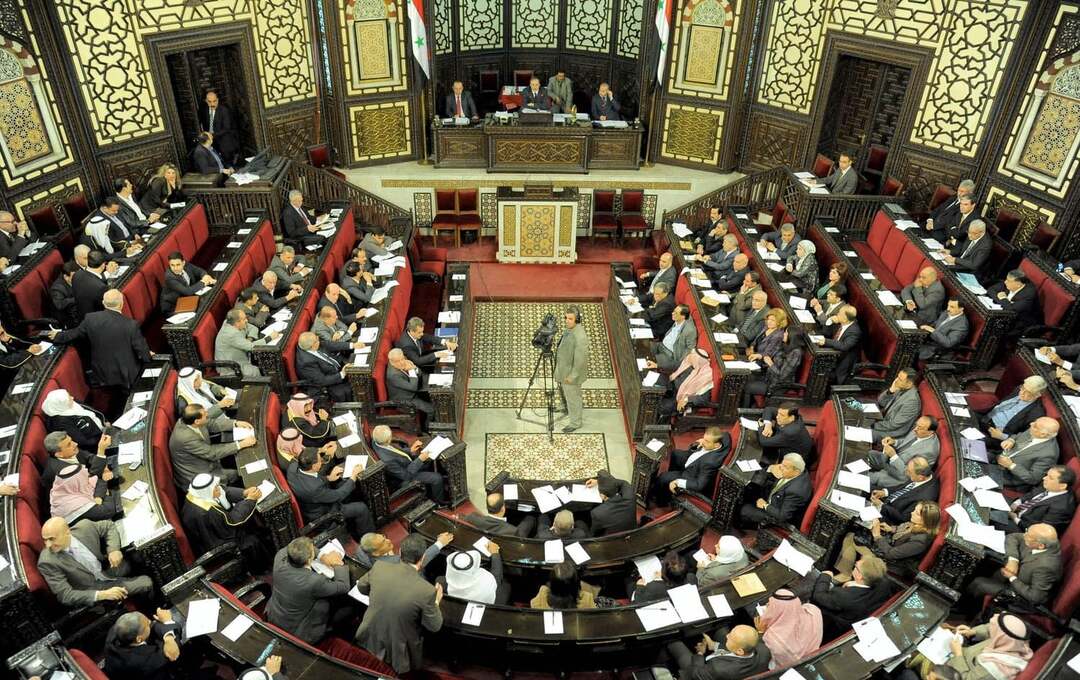-
Hunger knocks on Syrian parliament’s door amid severe living crisis

The Asharq Al-Awsat reported that a member of Syria’s parliament has warned that some of his colleagues were facing hunger, amid a severe living crisis which is expected to worsen with a government decision to increase fuel prices.
On his Facebook page, MP Nasser Youssef Al-Nasser called on Prime Minister Hussein Arnous to resign, pointing to corruption and the spread of hunger and poverty among citizens. He said that as a citizen before he was a member of the People’s Assembly, he also starved.
The government has repeatedly increased the prices of fuel and lifted subsidies on electricity, bread, medicine, and most basic materials.

Addressing Parliament on Sunday, Arnous said: “To fight corruption in the distribution of petroleum products, a direct cash support will be allocated to those eligible after raising the prices of subsidized gasoline and diesel fuel to be equal to the prices in the global market.”
Daesh attacks Ghwayran prison in Syria and frees extremists
In remarks to Asharq Al-Awsat, a Damascus resident told Asharq Al-Awsat that she was “shocked” by the premier’s statements, pointing to the people’s despair and sufferings.
Feelings of disappointment also prevailed over “the well-off”, including families, who have relatives outside the country and who receive monthly remittances ranging between $100-200.
One of them told Asharq Al-Awsat: “Every time they raise the prices of petrol and diesel, everything becomes more expensive, and the poor become more miserable…”
Syrian doctor goes on trial in Germany accused of crimes against humanity
UN Secretary-General Antonio Guterres shocked the members of the Security Council in a report he submitted recently in this regard, which Asharq Al-Awsat published a copy of.
Guterres sounded the alarm on the depth of the Syrian tragedy, saying that 90 percent of Syrians live in “poverty” and 60 percent suffer from “food insecurity.” In addition, as many as 7.78 million Syrians did not have access to an internationally acceptable minimum number of doctors or medical attendants.
Economists told Asharq Al-Awsat that if Arnous’ statements were implemented, this would lead to “unprecedented price hikes that would further erode the purchasing power.”
Syrians in diaspora and in refugee camps send a letter to Mr. Antonio Guterres
Government-controlled areas have long suffered from a stifling fuel crisis due to the control of the Arab-Kurdish Syrian Democratic Forces over the oil and gas fields in the north and north-east of the country, and the difficulty in importing oil as a result of the US sanctions.
In November, the government announced that it would raise electricity prices for all categories of household consumption by one hundred percent, amid a severe power crisis in government-controlled areas, with power outages reaching between 22 and 23 hours a day.
source: aawsat
You May Also Like
Popular Posts
Caricature
BENEFIT AGM approves 10%...
- March 27, 2025
BENEFIT, the Kingdom’s innovator and leading company in Fintech and electronic financial transactions service, held its Annual General Meeting (AGM) at the company’s headquarters in the Seef District.
During the meeting, shareholders approved all items listed on the agenda, including the ratification of the minutes of the previous AGM held on 26 March 2024. The session reviewed and approved the Board’s Annual Report on the company’s activities and financial performance for the fiscal year ended 31 December 2024, and the shareholders expressed their satisfaction with the company’s operational and financial results during the reporting period.
The meeting also reviewed the Independent External Auditor’s Report on the company’s consolidated financial statements for the year ended 31 December 2024. Subsequently, the shareholders approved the audited financial statements for the fiscal year. Based on the Board’s recommendation, the shareholders approved the distribution of a cash dividend equivalent to 10% of the paid-up share capital.
Furthermore, the shareholders endorsed the allocation of a total amount of BD 172,500 as remuneration to the members of the Board for the year ended 31 December 2024, subject to prior clearance by related authorities.
The extension of the current composition of the Board was approved, which includes ten members and one CBB observer, for a further six-month term, expiring in September 2025, pending no objection from the CBB.
The meeting reviewed and approved the Corporate Governance Report for 2024, which affirmed the company’s full compliance with the corporate governance directives issued by the CBB and other applicable regulatory frameworks. The AGM absolved the Board Members of liability for any of their actions during the year ending on 31st December 2024, in accordance with the Commercial Companies Law.
In alignment with regulatory requirements, the session approved the reappointment of Ernst & Young (EY) as the company’s External Auditors for the fiscal year 2025, covering both the parent company and its subsidiaries—Sinnad and Bahrain FinTech Bay. The Board was authorised to determine the external auditors’ professional fees, subject to approval from the CBB, and the meeting concluded with a discussion of any additional issues as per Article (207) of the Commercial Companies Law.
Speaking on the company’s performance, Mr. Mohamed Al Bastaki, Chairman BENEFIT , stated: “In terms of the financial results for 2024, I am pleased to say that the year gone by has also been proved to be a success in delivering tangible results. Growth rate for 2024 was 19 per cent. Revenue for the year was BD 17 M (US$ 45.3 Million) and net profit was 2 Million ($ 5.3 Million).
Mr. Al Bastaki also announced that the Board had formally adopted a new three-year strategic roadmap to commence in 2025. The strategy encompasses a phased international expansion, optimisation of internal operations, enhanced revenue diversification, long-term sustainability initiatives, and the advancement of innovation and digital transformation initiatives across all service lines.
“I extend my sincere appreciation to the CBB for its continued support of BENEFIT and its pivotal role in fostering a stable and progressive regulatory environment for the Kingdom’s banking and financial sector—an environment that has significantly reinforced Bahrain’s standing as a leading financial hub in the region,” said Mr. Al Bastaki. “I would also like to thank our partner banks and valued customers for their trust, and our shareholders for their ongoing encouragement. The achievements of 2024 set a strong precedent, and I am confident they will serve as a foundation for yet another successful and impactful year ahead.”
Chief Executive of BENEFIT; Mr. Abdulwahed AlJanahi commented, “The year 2024 represented another pivotal chapter in BENEFIT ’s evolution. We achieved substantial progress in advancing our digital strategy across multiple sectors, while reinforcing our long-term commitment to the development of Bahrain’s financial services and payments landscape. Throughout the year, we remained firmly aligned with our objective of delivering measurable value to our shareholders, strategic partners, and customers. At the same time, we continued to play an active role in enabling Bahrain’s digital economy by introducing innovative solutions and service enhancements that directly address market needs and future opportunities.”
Mr. AlJanahi affirmed that BENEFIT has successfully developed a robust and well-integrated payment network that connects individuals and businesses across Bahrain, accelerating the adoption of emerging technologies in the banking and financial services sector and reinforcing Bahrain’s position as a growing fintech hub, and added, “Our achievements of the past year reflect a long-term vision to establish a resilient electronic payment infrastructure that supports the Kingdom’s digital economy. Key developments in 2024 included the implementation of central authentication for open banking via BENEFIT Pay”
Mr. AlJanahi concluded by thanking the Board for its strategic direction, the company’s staff for their continued dedication, and the Central Bank of Bahrain, member banks, and shareholders for their valuable partnership and confidence in the company’s long-term vision.
opinion
Report
ads
Newsletter
Subscribe to our mailing list to get the new updates!





















